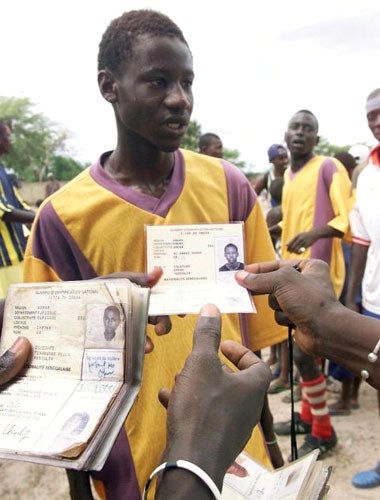Mbvoumin: 'Make no mistake, this is trafficking of young people'
A charity set up by a former Cameroon international says it has uncovered exploitation at all levels of the game in France

Your support helps us to tell the story
From reproductive rights to climate change to Big Tech, The Independent is on the ground when the story is developing. Whether it's investigating the financials of Elon Musk's pro-Trump PAC or producing our latest documentary, 'The A Word', which shines a light on the American women fighting for reproductive rights, we know how important it is to parse out the facts from the messaging.
At such a critical moment in US history, we need reporters on the ground. Your donation allows us to keep sending journalists to speak to both sides of the story.
The Independent is trusted by Americans across the entire political spectrum. And unlike many other quality news outlets, we choose not to lock Americans out of our reporting and analysis with paywalls. We believe quality journalism should be available to everyone, paid for by those who can afford it.
Your support makes all the difference.In the wake of the Gaël Kakuta scandal and Chelsea's subsequent transfer embargo, some French clubs have placed themselves firmly on the moral high ground. But it is not a position they are necessarily entitled to occupy, according to one French charity that picks up the pieces after young African footballers are dumped by their hosts.
Culture Foot Solidaire, set up by the former Cameroon international Jean-Claude Mbvoumin, works to help players, some as young as 11 who have been "exploited from the very start by the clubs".
The charity, which has worked with the European Union and with Fifa on the rights of these young players, warns: "Their number is on the rise and they are getting younger."
"Is it the right way to grow up, to be thousands of miles from home at 11 years old?" Mbvoumin said to The Independent yesterday. "To be trying to make a professional career at 11 years old? To be on the streets at 11 years old? Because at that age, youngsters are being trafficked from their homes in Africa to play for European clubs.
"There are clubs in France who talk about ethics and who like to think of themselves as occupying the moral high ground but, in our experience, not one is above reproach. In fact, the higher up the leagues you go, the worse the problem. At the top level, make no mistake, the problem is one of trafficking young people. And they're getting younger," he said.
"There may be some who say that the problem has gone away, that it doesn't happen any more but France is not well placed to make that claim. It exists and it is growing. Unfortunately, we find more and more youngsters abandoned every day," he added.
Most of the young footballers, many of whom cannot spell their own names, have stopped their schooling to come across the Mediterranean and ply a career in Europe.
The problem is on two levels: there are players who arrive at professional clubs and there are those who arrive at smaller clubs without any documents or work permits. "No one bothers to ask where they came from or how they got here," Mbvoumin said.
"The big clubs have representatives and scouts in Africa so, whether or not the player's arrival was solicited by the club or by some agent or by anyone else, it is the same thing.
"They work together. A club will say, 'We need a player,' then, by hook or by crook, they are sourced in Africa and brought over. Maybe not by the club directly, but it is the same thing," he added.
They come because there is a demand for young, cheap footballers. Where there is a demand, people will fill it.
Mbvoumin believes that the only thing of importance to the clubs is that the player is good. Not whether they have to pay for permits or contact the parents.
The parents are often aware of what is going on and most support it. "That is understandable," he said. "There is a lot of money to be made and some people are very poor. If someone offers £10,000 and says they going to take your son to be a star in Europe, what do you do?"
Problems arise when players are taken over from training camps not affiliated to the African Football Federation. In that case, often no one will even know that they have gone.
In English clubs' academies, young players receive an education. It is supposed to be the same at French clubs, but Mbvoumin believes that the rules are being bypassed across the Channel.
"A young player cannot go further than 150km [around 93 miles] to join a club in France. We know of boys who are 3,000km [around 1,864 miles] away from home," he said.
"Because it is Africa, people say, 'Well, they're poor, they must be helped etc'. That is not true. The African Football Federation needs to keep its best players. If we are to beat this problem, the answer must come from the federations. The clubs will not do it by themselves."
Join our commenting forum
Join thought-provoking conversations, follow other Independent readers and see their replies
Comments